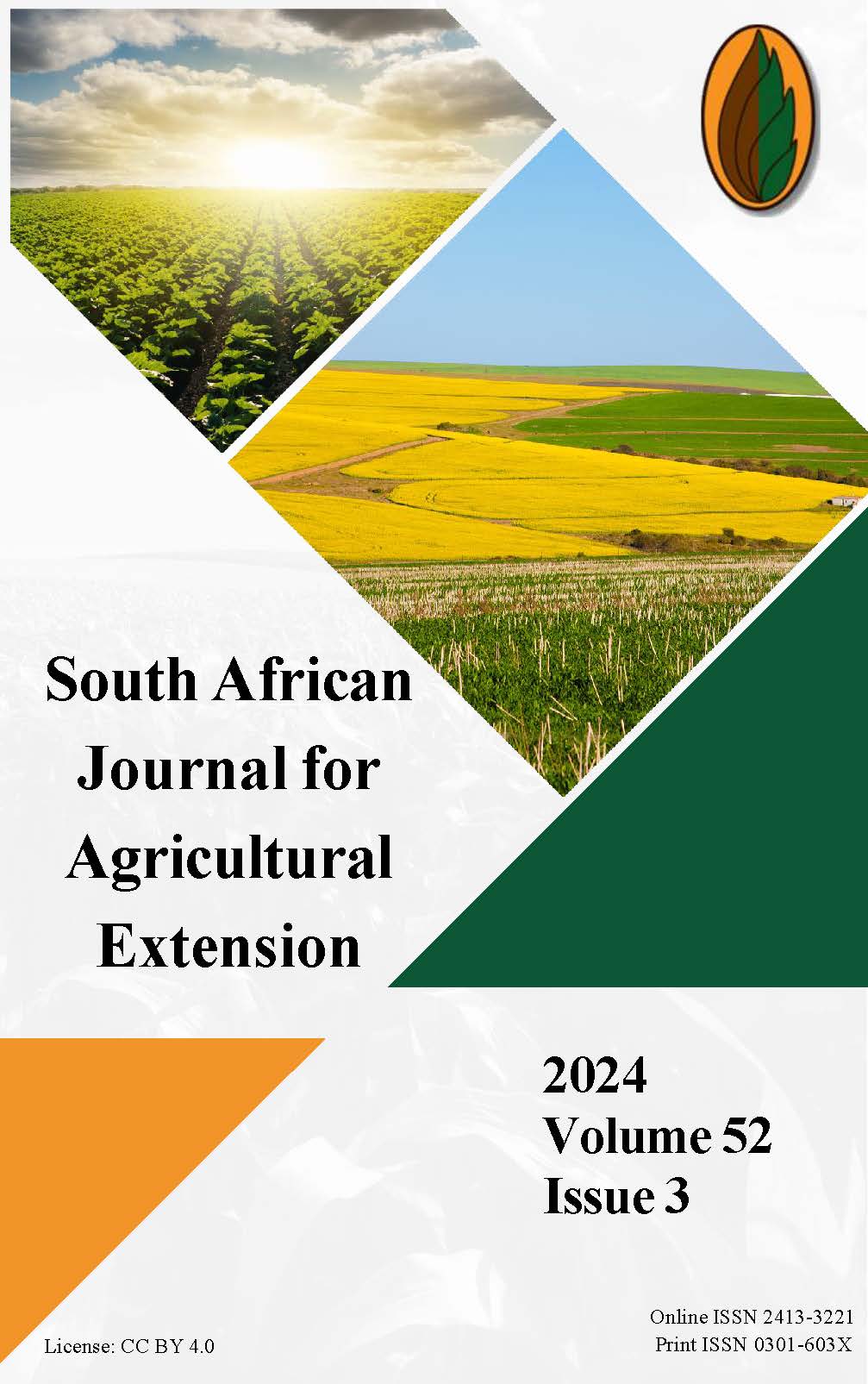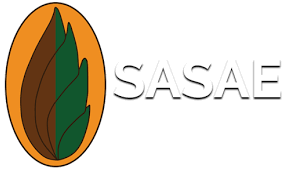Reimagining Agricultural Advisors and Educators as Agricultural Bricoleurs Towards Enhanced Skills Transfer: An Adult Learning Perspective
DOI:
https://doi.org/10.17159/2413-3221/2024/v52n3a13288Keywords:
Bricoleur, Agricultural Advisors, Skills Transfer, Adult Education, Constructivism, Agricultural EducatorsAbstract
Bricolage's approach describes how post-colonial, post-positivist, post-modernist, or post-structuralist paradigms have driven intellectuals to develop mixed multi-theoretical and multi-methodological methods. Bricoleurs must contextualise the approaches using the metaphor and articulate its meaning and inferences for advisory services in attempting to do so, as agricultural advisors as bricoleurs and emerging farmers view themselves as co-advisors, guided by bricolage principles. The bricoleurs, equipped with adult education approaches and emerging farmers, will engage in a skills transfer exercise in an agricultural environment. In contrast, a bricoleur plays the role of a facilitator, not a teacher or an expert. Emerging farmers are knowledgeable, and many have years of experience working in the farming environment and have massive knowledge and experience that they can circulate amongst themselves. Bricolage highlights the relationship between agricultural advisors' ways of seeing and the social location of their personal history. The agricultural advisor-as-bricoleur abandons the quest for the naive concept of realism. It focuses instead on clarification of their position in the web of reality, the social locations of other co-advisors and the ways they shape the production and interpretation of knowledge. Bricolage tracks significant ruptures in epistemological, ontological, ethical, and political underpinnings that influence agricultural advisors. The record shows that, while traditional agricultural extension services were based on positivist rationalities, successive generations must adopt more interpretive, post-positivist, post-colonial, post-modern, constructivist, and post-structuralist approaches. As a guiding theory for agricultural extension advisors, Bricolage can improve skills transfer amongst emerging farmers by using limited resources to complete specific tasks.
Downloads
References
ANANDAJAYASEKERAM, P., SINDU, W. & KRISTIN, E.D., 2007. Farmer field schools: An alternative to existing extension systems? Experience from Eastern and Southern Africa. J. Int. Agric. Ext. Educ., 14(1): 81–93.
ATTARD, A., DI LORIO, E., GEVEN, K. & SANTA, R., 2010. Student-centred learning – a toolkit for students, staff and higher education institutions. Brussels: European Students Union.
AWASES, C.L., 2015. Secondary school Geography teachers' understanding and implementation of learner-centred education and enquiry-based teaching in Namibia. Masters' dissertation. Stellenbosch University.
BABINTSEV, V., SAPRYKA, V. & SERKINA, Y., 2015. Formal rationality traps in the administration of higher education institutions in Russia. Procedia Soc Behav Sci., 214(June): 520–525.
BANSAL, P., SMITH, W. & VAARA, E., 2018. New ways of seeing through qualitative research. Acad Manage J., 61(4): 1189–1195.
BARLOW, L. & VAN DIJK, N., 2013. Market investigation of black emerging farmers in South African horticulture. Cooperation, 1–23.
BEN-ARI, M., 1998. Bricolage Forever. 11th Annual Workshop, 5-7 January, Computer-Based Learning Unit, University of Leeds, Leeds, UK.
BEN-ASHER, S., 2022. The virtuoso art of bricolage research. Front. Psychol., 13: 1068703.
BERNARD, R., MSUNGU, A.C. & SANARE, R., 2013. Using mobile phones for teaching and learning purposes in higher learning institutions: The Case of Sokoine University of Agriculture in Tanzania. Proceedings and Report of the 5th Ubuntu Net Alliance Annual Conference., 2223(7062): 118–129.
BLIGNAUT, J., 2015. Sustainable farming is a viable option for enhanced food and nutritional security and a sustainable, productive resource base. Synthesis report. Green Economy Research Report, Green Fund, Development Bank of Southern Africa, Midrand.
BUSCH, C. & BARKEMA, H., 2021. From necessity to opportunity: Scaling entrepreneurial Bricolage across resource‐constrained environments. Strategic Manage J., 42(4): 741-773.
BUSO, N., 2003. Municipal commonage administration in the Free State province: Can municipalities in the current local government dispensation promote emerging farming ? Available from: chrome-extension://efaidnbmnnnibpcajpcglclefindmkaj/https://www.cogta.fs.gov.za/wp-content/uploads/2012/01/Municipal-Commonage-Administration-in-the-FS-2003.pdf
CANKAYA, S., KUTLU, Ö. & CEBECI, E., 2015. The educational policy of the European Union. Procedia Soc Behav Sci., 174: 886–893.
CARDNO, C., ROSALES-ANDERSON, N. & MCDONALD, M., 2017. Documentary analysis hui: An emergent bricolage method for culturally responsive qualitative research. MAI Journal., 6(2): 143–152.
CHINGWARE, T., 2014. Impact of trade and economic liberalisation policy reforms on the operations of selected small to medium enterprises (SMEs) in Zimbabwe: A comparative study with South Africa's experiences. Doctoral Dissertation. Durban University of Technology.
CHRISTIDOU, V., HATZINIKITA, V. & GRAVANI, M., 2012. Pedagogic practices promoted by distance learning educational material on adult education. Procedia Soc Behav Sci., 46: 1988 – 1996.
CIAMBOTTI, G., ZACCONE, M.C. & PEDRINI, M., 2023. Enabling Bricolage in resource-constrained contexts: the role of sense of community and passion in African social entrepreneurs. J. Small Bus. Enterp. Dev., 30(1): 167–185.
CLAASSEN, H., MUKWADA, G., NAIDOO, M. & MAHASA, P., 2014. Land reform and grain production: The case of emerging farmers in Qwaqwa, South Africa. J Hum Ecol., 46(2): 223-234.
COLE, L., 2022. Assembling a cabinet of curiosities: Using participatory action research and constructivist grounded theory to generate stronger theorisation of public sector innovation labs. Particip. Res. Methods., 3(2).
CROOKES, K., CROOKES, P.A. & WALSH, K., 2013. Meaningful and engaging teaching techniques for student nurses: A literature review. Nurse Education in Practice, 13(4): 239–243.
EADY, M., HERRINGTON, A. & JONES, C., 2010. Literacy practitioners' perspectives on adult learning needs and technology approaches in Indigenous communities. Aust. J. Adult Learn., 50(2): 260-286.
GEHMAN, J., GLASER, V.L., EISENHARDT, K.M., GIOIA, D., LANGLEY, A. & CORLEY, K.G., 2018. Finding theory–method fit: A comparison of three qualitative approaches to theory building. J. Manag. Inq., 27(3): 284–300.
HANNAFIN, M.J. & HANNAFIN, K.M., 2010. Cognition and student-centered, web-based learning: Issues and implications for research and theory. In J.M. Spector, D. Ifenthaler, P. Isaias, Kinshuk & D. Sampson (eds.), Learning and Instruction in the Digital Age. New York: Springer, pp. 11-23.
HAVA, H.T. & ERTURGUT, R., 2010. Function of planning in adult education. Procedia Soc Behav Sci., 2(2): 3324–3328.
HAVLIN, J.L., BEATON, J.D., TISDALE, S.L. & NELSON, W.L., 1999. Soil fertility and fertilisers: An introduction to nutrient management. In J.L. Havlin, J.D. Beaton, S.L. Tisdale. & W.L. Nelson (eds.), Soil Fertility and Fertilisers. Pearson India Education Services. pp. 1–243.
HIRUMI, A., 2002. Student-centred, technology-rich learning environments (SCenTRLE): Operationalising constructivist approaches to teaching and learning. J. Technol. Teacher. Educ., 10(4): 497–537.
HOTA, P., MITRA, S. & QURESHI, I., 2019. Adopting Bricolage to overcome resource constraints: The case of social enterprises in Rural India. Manage Organ Rev., 15(2): 371-402.
HUNT, W., BIRCH, C., VANCLAY, F. & COUTTS, J., 2014. Recommendations arising from an analysis of changes to the Australian agricultural research, development and extension system. Food Policy., 44: 129–141.
IDOWU, O.O., 2005. Farmers' perception of agricultural extension agents' characteristics as factors for enhancing adult learning in Mezam division of Northwest Province of Cameroon. Aust. J. Adult Learn., 45(2): 223–237.
JAKOBSONE, A. & CAKULA, S., 2015. Automated learning support system to provide sustainable cooperation between adult education institutions and enterprises. Procedia Comput. Sci., 43(C): 127–133.
KARAAN, M. & KIRSTEN, J., 2008. A programme to mainstream black farmers into supply chains: An emphasis on fresh produce. Recovering Markets. Policy Brief 6. Department of Agricultural Economics, Extension and Rural Development, University of Pretoria.
KINCHELOE, J., 2004. Rigour and complexity in educational research: Conceptualizing the bricolage. Maidenhead: Open University Press.
LACY, J., 2011. Cropcheck: Farmer benchmarking participatory model to improve productivity. Agric. Systems., 104(7): 562–571.
LALEYE, A.M., 2015. Educational technology for effective service delivery in educational training and research in Nigeria. Procedia Soc Behav Sci., 176: 398–404.
LE LOARNE, S., 2005. Bricolage versus creativity what's the difference? Available from: %3Chal-00451857%3E.
LI, J., NAUGHTON, J. & NEHME, R.V., 2015. Resource bricolage for parallel database systems. Pvldb., 8(1): 25–36.
MABAYA, E., TIHANYI, K., KARAAN, M. & VAN ROOYEN, J., 2011. Case studies of emerging farmers and agribusinesses in South Africa. Sun Press., 1: 311.
MAHINI, F., FORUSHAN, Z.J. & HAGHANI, F., 2012. the importance of teacher's role in technology-based education. Procedia Soc Behav Sci., 46: 1614-1618.
MAHLOMAHOLO, S.M.G., 2013. The naivety of Empiricism Versus Complexity of Bricolage in Creating Sustainable Learning Environments. 6th International Conference of Education, Research and Innovation, 18-20 November, Seville, Spain, pp. 4690–4699.
MAKHURA, M.N., MDA, M., MARAIS, P. & JACOBS, J., 2011. Addressing challenges of financing emerging farmers. Available from: http://www.landbank.co.za/agri_info/Reports/Emerging Farmers/1 final emergers farmers 18.pdf.
MASHAMBA, M.A., 2012. An assessment of the effectiveness of training for extension staff in the Limpopo Department of Agriculture. Masters thesis. University of Limpopo.
MASHROOFA, M.M. & SENEVIRATHNE, W., 2014. Influence of information literacy skills in accessing agricultural information: With special reference to paddy farmers of Ampara district, Sri Lanka.
MSILA, V. & SETLHAKO, A., 2012. Teaching (still) Matters: Experiences in developing a pedagogical online module at UNISA. Procedia Soc Behav Sci., 69: 136–142.
MSONDE, C.E., 2011. Enhancing teachers' competencies on learner-centred approaches through learning study in Tanzanian schools. Unpublished Doctoral Thesis. University of Hong Kong. Hong Kong.
NYIKA, L. & MURRAY-ORR, A., 2017. Critical race theory–social constructivist Bricolage: A health-promoting schools research methodology. Health Educ. J., 76(4): 432-441.
OMOTO, M.P. & NYONGESA, W.J., 2013. Content-based instruction: A study of methods of teaching and learning english in primary schools in Butula District. Int. J. Bus. Soc. Sci., 4(5): 236–246.
PHILLIMORE, J., BRADBY, H., KNECHT, M., PADILLA, B. & PEMBERTON, S., 2019. Bricolage as conceptual tool for understanding access to healthcare in superdiverse populations. Social Theory Health., 17: 231–252.
PRATT, M.G., SONENSHEIN, S. & FELDMAN, M.S., 2022. Moving beyond templates: a bricolage approach to conducting trustworthy qualitative research. Organ. Res. Methods., 25: 211–238.
PREECE, S.B., 2014. Social Bricolage in arts entrepreneurship: Building a jazz society from scratch. Artivate: J. Entrepreneurship. Arts., 3(1): 23.
REAY, T., ZAFAR, A., MONTEIRO, P. & GLASER, V., 2019. Presenting findings from qualitative research: One size does not fit all! Res. Sociol. Organ., 59: 201–216.
RIISE, J.C., PERMIN, A., LARSEN, C.E. & IDI, A., 2002. Optimising appropriate technology transfer to small producers, 2–7.
ROBERTS, G. & ROBERTS, T.G., 2006. A philosophical examination of experiential learning theory for agricultural educators. J. Agric. Educ., 47(1): 17–29.
RUBENSON, K., 2007. Adult Learning in Canada in an International Perspective. Adult Education Research Conference. Available from: https://newprairiepress.org/aerc/2007/papers/89
SEHRING, J., 2009. Path dependencies and institutional Bricolage in post-Soviet water governance. Water Alternatives., 2(1): 61–81.
SHARP, H., 2019. Bricolage research in history education as a scholarly mixed-methods design. Hist. Educ. Research. J., 16(1): 50–62.
SMARRELLA, T., 2015. Training principles of adult learning. Solutions Design Group. Available from: https://cdns3.trainingindustry.com/media/2068131/principlesofadultlearning_full.pdf.
STENHOLM, P. & RENKO, M., 2016. Passionate bricoleurs and new venture survival. J. Bus. Ventur., 31(5): 595-611.
TAYLOR, P. & MULHALL, A., 2001. Linking learning environments through agricultural experience - enhancing the learning process in rural primary schools. Int. J. Educ. Dev., 21(2): 135–148.
THOMPSON-HARDY, E.B., 2018. Chapter Two: Situating the Bricolage: Research and the Critical Tradition. Counterpoints., 522: 25–73.
TSHABALALA, M., NDEYA-NDEREYA, C. & VAN DER MERWE, T., 2014. Implementing blended learning at a developing university: Obstacles in the way. Electronic Journal of E-Learning., 12(1): 101–110.
VAN EEKELEN, I. M., VERMUNT, J.D. & BOSHUIZEN, H.P.A., 2006. Exploring teachers' will to learn. Teaching and Teacher Education., 22: 408-423.
VERMEULEN, H., KIRSTEN, J. & SARTORIUS, K., 2008. Contracting arrangements in agribusiness procurement practices in South Africa. Agrekon., 47(2): 198–221.
VYGOTSKY, L., 1996. Constructivism: A psychological theory of learning. Catherine Twomey Fosnot and Randall Stewart Perry.
WRIGHT, W.A., KNIGHT, P.T. & POMERLEAU, N., 1999. Portfolio people: Teaching and learning dossiers and innovation in higher education. Innov. High. Educ., 24(2): 89–103.
Downloads
Published
Issue
Section
License
Copyright (c) 2024 T. Teele, M.M. Nkoane

This work is licensed under a Creative Commons Attribution 4.0 International License.








.png)